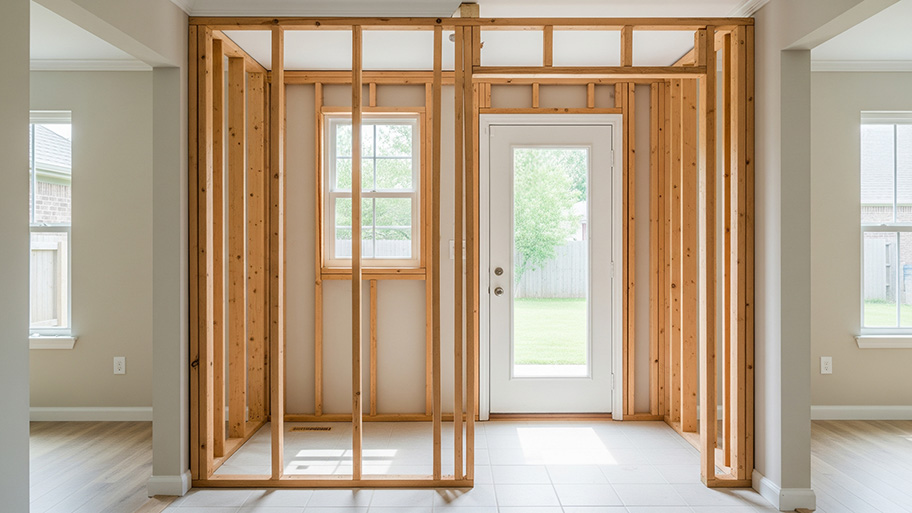
Sometimes, all your home needs is a new wall to make a room or provide an updated function to an existing space. Learn how much it costs to install a new wall.
A work warranty lasts for one year for most remodeling projects


Work warranties guarantee a contractor will repair problems related to their work.
Most contractors offer a one-year warranty on services.
Warranties cover shoddy workmanship, materials, or design issues.
After completing a major renovation or home improvement project, the last thing you want is an unexpected issue or breakdown. A work warranty helps protect homeowners by covering anything that was damaged because of work done incorrectly. But how long does a contractor have to warranty their work? While one year is a typical length for a work warranty, it can vary, and most states leave it up to the contractor.
If you experience any unexpected issues after construction has ended on a home renovation, like issues with your home’s floors or foundation, electrical system, or plumbing, a work warranty covers the cost of repairs. A work warranty is generally considered a “work and materials” warranty, because the contractor agrees to provide labor and supplies needed to correct a problem during the designated period. Contractors often expect to return to address a few issues, such as caulking that cracks after it dries.
How long does a contractor have to warranty their work? While an average work warranty lasts about a year, warranty length can vary by state and contractor. Contractors who want to retain client goodwill may honor a work warranty for longer than the specified time. This is something you should discuss with companies before choosing the right local contractor for your project.
While home warranties cover a variety of post-construction issues and repairs, they don’t cover everything. Construction warranties cover anything that fails or becomes damaged due to the contractor's workmanship. Here are the ins and outs of warranty coverage after a renovation.
Defective workmanship: Contractors guarantee that their work is up to code and according to industry standards. For example, if a set of hanging cabinets collapses because the contractor failed to secure them properly, this would be due to defective workmanship.
Materials: Contractors generally won’t cover products with their own manufacturer’s warranties, but when they build something themselves, they are responsible for choosing quality products. For example, if a contractor built a custom tub surround out of poor-quality MDF, they should cover repairs if it warps after exposure to a reasonable amount of humidity.
Structural integrity: A project must adhere to building standards and codes to ensure the safety of those living in the home. If a firm’s architect designs a building that becomes cracked under strong winds, the contractor would be responsible for the cost of repairs.
However, work warranties don’t cover materials or appliances that fail on their own. Those are covered by manufacturer warranties. You may want to ask your contractor if they will provide labor to remove a failed appliance or fixture that is replaced through a manufacturer warranty.
Work warranties usually don’t cover damage a homeowner causes, but it could still be worth asking the contractor to take a look if something breaks after an accident in the kitchen or bathroom. For instance, if you knock something off the kitchen counter and it cracks a floor tile, you may have to pay for the repair.
But by contacting the contractor, you may learn that the tile cracked because there wasn’t enough mortar beneath it. In that case, an honest contractor should take responsibility by fixing the mortar and replacing the tile.
If you choose your own fixtures or materials for a project, a contractor may not be willing to warrant any work required if those fail, such as water damage caused by a leak stemming from a defective faucet.
From average costs to expert advice, get all the answers you need to get your job done.

Sometimes, all your home needs is a new wall to make a room or provide an updated function to an existing space. Learn how much it costs to install a new wall.

The cost to frame a house can vary depending on the size of your home, the structure you’re building, and your materials. Keep reading to learn how much framing your house might cost.

Going from an undeveloped plot to your dream home can be expensive. Learn about the cost to develop land and what factors can affect your total.

Are you a conscientious homeowner interested in salvaging unwanted materials from your home? Keep reading to discover what green demolition is and its benefits.

When planning a home renovation or remodel, asking your contractor to reduce the price of the job is never an easy task. But negotiation is possible! Read these tips for negotiating with a contractor the right (and effective) way.

Learn about the pros and cons of hiring a general contractor to handle your home renovation project and why research to find the right one matters.